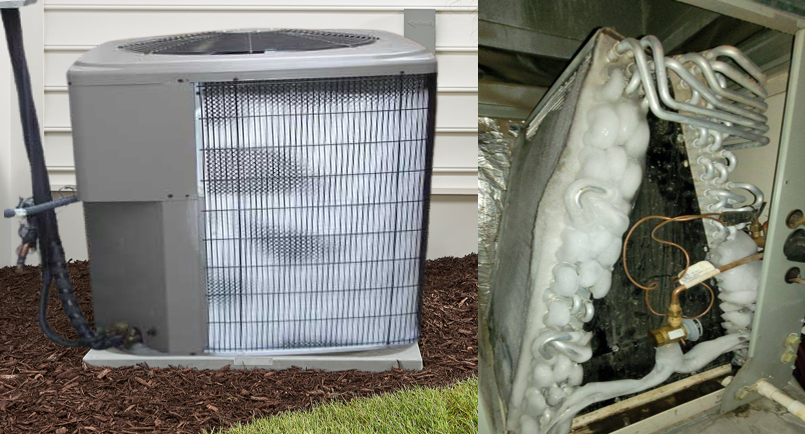What Causes AC Freezing Up With Ice On Coils?
As residents of San Antonio and Austin, Texas, we know all too well how brutal the summer heat can be. Your air conditioning system is your lifeline during those scorching days, but what happens when it starts freezing up? Seeing ice on your AC coils can be alarming—and it’s a sign that something’s wrong. This issue can occur on both the inside unit (typically the evaporator coil in your home’s air handler) and the outside unit (the condenser coil), though it’s more common indoors during cooling mode. In heat pump systems during cooler months, the outdoor coil might freeze due to humidity and temperature drops. Don’t worry—understanding the causes can help you address it quickly. At Air & Plumbing Today, we’re here to break it down for you.
Common Causes of Frozen AC Coils
Frozen coils happen when moisture in the air condenses and freezes on the coils, often due to imbalances in airflow, refrigerant, or system components. Here are the main culprits, based on common HVAC issues:
- Dirty Air Filters: A clogged filter restricts airflow over the evaporator coil, causing the temperature to drop too low and leading to ice buildup. This is one of the most frequent causes, especially in dusty Texas environments.
- Low Refrigerant Levels: Often from a leak, low refrigerant reduces pressure in the system, making the coils too cold and prone to freezing. This affects both indoor and outdoor units if unchecked.
- Dirty or Blocked Evaporator/Condenser Coils: Dust, dirt, or debris on the coils hinders heat transfer. For indoor units, this traps cold air; for outdoor units, it can happen if fins are bent or clogged, especially in pollen-heavy areas like Austin.
- Insufficient Airflow: Blocked vents, closed registers, or a failing blower fan can starve the system of air, leading to freezing. This is common in both inside and outside units if airflow is impeded.
- Faulty Thermostat or Sensors: A malfunctioning thermostat might run the AC too long or at incorrect settings, causing overcooling and ice formation.
- Clogged Condensate Drain Line: If the drain backs up, excess moisture can freeze on the coils, particularly in humid Texas weather.
- Broken Fans or Components: A faulty blower motor indoors or condenser fan outdoors reduces airflow, exacerbating freezing.
- Low Outdoor Temperatures: For heat pumps in winter mode, the outdoor coil can freeze due to cold air and humidity, often from a failed defrost cycle.
- Oversized AC Unit or Faulty Expansion Valve: An improperly sized system cycles too quickly, or a bad valve disrupts refrigerant flow, leading to uneven cooling and ice.
- Contaminants or System Issues: Rarely, water intrusion, dense filters, or other contaminants can plug the coils.
Ignoring frozen coils can lead to reduced efficiency, higher bills, or even compressor failure—so act fast!
How an AC Repair Technician Diagnoses and Fixes a Frozen Unit
If you spot ice on your coils in San Antonio or Austin, call a professional right away. Here’s what a skilled technician from Air & Plumbing Today would do:
- Initial Assessment: They’ll start by turning off the AC at the thermostat (switch to “Off” and set the fan to “On” to speed thawing) and inspect for visible ice on both indoor and outdoor units.
- Thawing the System: Allow the unit to defrost naturally or use safe methods like running the fan—never use heat sources that could damage components.
- Diagnostic Checks: Measure refrigerant levels with gauges to detect leaks, test airflow with anemometers, inspect filters and coils for dirt, check the thermostat and sensors, and evaluate fans, valves, and drain lines.
- Repairs: Clean or replace dirty filters/coils, recharge refrigerant and seal leaks, repair or replace faulty parts like fans or valves, clear blockages, and ensure proper system balance.
- Testing: Restart the system, monitor pressures and temperatures, and confirm everything runs smoothly.
Our technicians are experts at handling frozen coils and can often fix them on the spot, getting your home cool again without delay.
Prevention Tips for Homeowners
You don’t have to wait for a freeze-up—here are simple steps to keep your AC running smoothly:
- Change Air Filters Regularly: Swap them every 1-3 months, or more often in high-dust areas like San Antonio.
- Keep Vents and Registers Open: Avoid blocking airflow with furniture or rugs.
- Schedule Annual Maintenance: Have a pro inspect and clean your system yearly to catch issues early.
- Clear the Condensate Drain: Use a wet/dry vacuum to remove clogs periodically.
- Maintain the Outdoor Unit: Keep it free of debris, leaves, and snow (in rare Texas winters), and ensure good clearance around it.
- Avoid Overcooling: Don’t set your thermostat below 70°F in hot weather, and check refrigerant levels during tune-ups.
- Monitor for Issues: If you notice weak airflow or unusual noises, address them promptly.
By staying proactive, you can avoid costly repairs and keep your home comfortable year-round.
Trust Air & Plumbing Today for Expert AC Repairs
At Air & Plumbing Today, our certified technicians are true experts when it comes to diagnosing and repairing AC units with frozen coils—whether it’s your inside evaporator or outside condenser. We serve San Antonio and Austin with fast, reliable service, and we can often resolve the issue immediately during our visit. Best of all, we offer no trip fees, no diagnostic fees, and free estimates 7 days a week. Don’t let a frozen AC ruin your day—give us a call today at (210) 519-5959 or visit airandplumbingtoday.com to schedule your service. Stay cool, Texas!
San Antonio: 210-519-5959
Austin: 512-859-5959

Our Offices
3615 Tavern Oaks San Antonio TX 78247
2009 FM 620 N Lakeway, TX 78734
Call or Text Us
Email Us
Hours
24/7 EMERGENCY SERVICE
(A live person always answers)
By submitting this form and signing up for texts, you consent to receive messages from Air & Plumbing Today LLC at the number provided regarding your request, updates about appointments and services or promotions and offers, including messages sent by autodialer. Consent is not a condition of purchase. Msg & data rates may apply. Msg frequency varies. Unsubscribe at any time by replying STOP. Reply HELP for help. Privacy Policy & Terms

Recent Comments